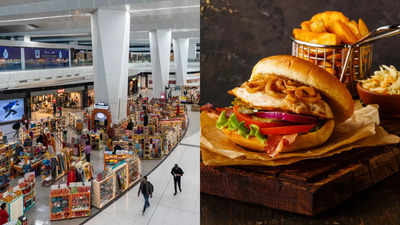Trending
Eat out at malls, finding them 'safe'? Now food audits for them as well
Karnataka health department's stringent measures include testing 39 kebab samples, finding sunset yellow in seven, highlighting the need for maintaining food safety standards.

When it comes to visiting malls, shopping and dining are two things that excite us a lot. But, how would you react if eating at a mall leads to serious food poisoning, or if you find infested food items at the popular chains? Well, this has recently happened at a mall in Hyderabad and that now led to having food safety audits of malls in the city.
As per latest reports, Lulu Mall in Kukatpally was found to have infested atta bread and loose baguette bread in its unit.Also, expired food products such as sesame seeds, milk, and biscuit packets were found past their expiry date.
Also Read: Popular eating joints in India that have violated food safety and sanitation norms
This has finally led to the announcement of food safety officials to conduct comprehensive food safety checks to ensure that malls comply with food safety rules, standards, and regulations.

Many such instances have resulted in this audit, which is expected to reduce the chances of food poisoning and discomfort at malls. As per reports, two months ago, Sarath City Mall in Kondapur was inspected and water bottles worth 68,400 were confiscated due to substandard quality and packaging.
Also, recently, the Karnataka health department banned the use of artificial colours in kebabs, after detecting unsafe levels of sunset yellow and carmoisine. According to the health department, 39 kebab samples were collected from various parts of the stare and after the test of these samples, it was found that seven kebab samples had sunset yellow and one contained both sunet yellow and carmoisine.
Also Read: FSSAI cancels manufacturing licences of 111 spice producers across India
In reaction to the report, the department issued an order on June 21 stating, “Such additives, as per the Food Safety and Standards Act, 2006, and the Food Safety and Standards (Food Products, Standards and Food Additives) Regulations, 2011, pose serious health risks to consumers.”
As per the law, the violation of the rules can lead to imprisonment ranging from a minimum of seven years up to a life term and a fine of up to Rs 10 lakh.
What is Carmoisine?
Carmoisine, also known as Azorubine or Food Red 3, is a synthetic azo dye used as a food coloring agent to impart a red or maroon color to various food products. It is commonly found in candies, beverages, jams, jellies, processed foods, and cosmetics. Carmoisine is assigned the E number E122 and is approved for use in the European Union but is subject to regulation and restrictions in other regions. However, excess consumption of this artificial colour is associated with major health issues.
Thumb and Embed Images Courtesy: istock
As per latest reports, Lulu Mall in Kukatpally was found to have infested atta bread and loose baguette bread in its unit.Also, expired food products such as sesame seeds, milk, and biscuit packets were found past their expiry date.
Also Read: Popular eating joints in India that have violated food safety and sanitation norms
This has finally led to the announcement of food safety officials to conduct comprehensive food safety checks to ensure that malls comply with food safety rules, standards, and regulations.
As per reports, such inspections will focus on quality of packaged foods, and also check that no expired products are on the shelf of the shops, ensuring safety of customers.

Many such instances have resulted in this audit, which is expected to reduce the chances of food poisoning and discomfort at malls. As per reports, two months ago, Sarath City Mall in Kondapur was inspected and water bottles worth 68,400 were confiscated due to substandard quality and packaging.
Also, recently, the Karnataka health department banned the use of artificial colours in kebabs, after detecting unsafe levels of sunset yellow and carmoisine. According to the health department, 39 kebab samples were collected from various parts of the stare and after the test of these samples, it was found that seven kebab samples had sunset yellow and one contained both sunet yellow and carmoisine.
Also Read: FSSAI cancels manufacturing licences of 111 spice producers across India
In reaction to the report, the department issued an order on June 21 stating, “Such additives, as per the Food Safety and Standards Act, 2006, and the Food Safety and Standards (Food Products, Standards and Food Additives) Regulations, 2011, pose serious health risks to consumers.”
As per the law, the violation of the rules can lead to imprisonment ranging from a minimum of seven years up to a life term and a fine of up to Rs 10 lakh.
What is Carmoisine?
Carmoisine, also known as Azorubine or Food Red 3, is a synthetic azo dye used as a food coloring agent to impart a red or maroon color to various food products. It is commonly found in candies, beverages, jams, jellies, processed foods, and cosmetics. Carmoisine is assigned the E number E122 and is approved for use in the European Union but is subject to regulation and restrictions in other regions. However, excess consumption of this artificial colour is associated with major health issues.
Thumb and Embed Images Courtesy: istock
End of Article
FOLLOW US ON SOCIAL MEDIA









